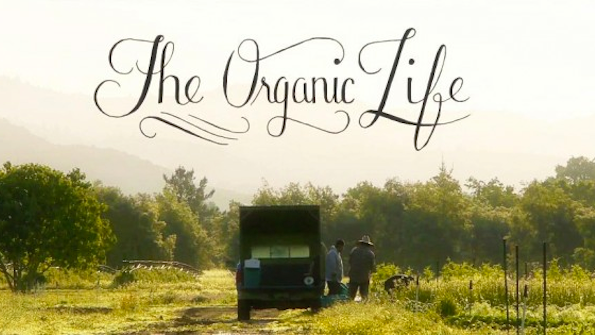The organic life: saying "I do"
Organic Connections, the online magazine of Natural Vitality, takes a behind-the-scenes look at the new documentary, The Organic Life.
April 16, 2014

 “I never thought I’d be a farmer’s wife,” says filmmaker Casey Beck in the opening scenes of her documentary The Organic Life, which debuted April 8 on iTunes and Amazon. From the opening scene, Beck’s devotion to the film’s subjects—her soon-to-be husband, Austin Blair, and the small organic vegetable farm on which he works in Sonoma County, California—is clear.
“I never thought I’d be a farmer’s wife,” says filmmaker Casey Beck in the opening scenes of her documentary The Organic Life, which debuted April 8 on iTunes and Amazon. From the opening scene, Beck’s devotion to the film’s subjects—her soon-to-be husband, Austin Blair, and the small organic vegetable farm on which he works in Sonoma County, California—is clear.
But is the lifestyle Blair has chosen, of growing vegetables and working long and physically demanding hours, sustainable? Sustainable for him? Sustainable for her? Sustainable for them as a couple? Will living month to month financially “just above poverty level,” with meager out-of-pocket healthcare and a protein-poor diet, eventually push the couple to seek other work?
Beck and Blair did not grow up farming. They had typical childhoods. They ate at Taco Bell, drank soda, and shopped at supermarkets for produce. Blair didn’t eat fresh spinach until he was in his twenties, he confesses. In fact, Beck had no inkling that Blair would become a farmer when she met him in college. “We both loved the outdoors, but I had no idea this was in his future,” she says.
The turning moment was when the couple lived on the seventeenth floor of a building in Buenos Aires, Argentina. They got a care package from the States with a science magazine. “The whole issue was about the future of cities, including food, and it showed rooftop gardens,” says Beck. “We looked out over the miles and miles of roofs around us and thought, ‘The way to grow is rooftop gardens! All of this white cement should be green.’”
Shortly after, she and Blair worked on a small family farm in Mendoza. “Austin fell in love with it,” Beck recalls. When they got back to the US, Blair found an apprenticeship in Sacramento, California, and then signed on with Paul’s Produce in Sonoma. The film documents his first two years of growing there.

Like what you're reading? Click here for more from Organic Connections.
Beck, whose filmmaking has taken her all over the world, turned the camera on Blair when she realized just how skewed the mainstream view of organic farming can be. “I wanted to capture the way that a year unfolds on a small organic farm,” she says. There are a lot of documentaries about organic farmers and the local-foods movement, but none had followed the cycle from as personal a perspective as that of a partner living and experiencing the small-farm existence day in and day out. “I felt that the lifestyle wasn’t accurately represented.”
The reason? Most filmmakers don’t have access to the farmers for a whole year, for more than an afternoon or a week, and producers and editors can’t afford to live on a farm for a year, she explains. “So there is an imbalance in the positives and negatives, the challenges and the rewards [of small organic farming],” she says. “Media often focuses on one or the other. I wanted to honor the complexity.” The result? A film that is not overtly political, not out to convince you to eat organic, but offers “a window into what it’s really like on the farm.
Without a political agenda, Beck opens the lens on the moments that even organic produce lovers typically don’t see: the hard work of hoeing weeds because the farmer hasn’t sprayed weed-control chemicals; washing and bagging greens over and over; picking (and eating) wormy feed corn; coming home with cracked and dirt-stained hands. Or slaughtering a chicken because it turns out to be male—and roosters aren’t allowed on the property. There are mistimed crops, the challenges of selling, as well as “tension and bickering.”
A small farmer's "vow of poverty"
The “vow of poverty” that small-farm farmers take is not hyperbole, Beck points out. “Farmers work 10-to-14-hour days and live just above the poverty line.” Every year when they do taxes, she wonders, “How do we live on so little?” The bigger question is about society’s values, she says. Why do we support a food system that reduces its costs by methods that create environmental pollution and health issues? It’s a difficult question to answer, she admits, a question that this film hasn’t set out to answer.
On the positive side, Beck observed that making the film showed her the strengths of her relationship, that Blair could manage the extreme demands of his profession and the demands of their relationship. “Most farmers love food—growing it, providing it, cooking it—and when you come together around food it really does strengthen your relationship,” she says. “You have more energy, and you feel better. You’re more able to be present. There’s a positive feedback loop.”
Will Blair continue to farm? Beck isn’t sure how the couple will cope if and when they decide to have children, if circumstances change. And yet Blair reflects toward the end of the film, “It fulfills me. It sustains me. It doesn’t get much better than that.”
Watch The Organic Life and connect: Find the film on iTunes and Amazon. Follow the film on Facebook, Twitter, and on the website, www.theorganiclifemovie.com.
About the Author(s)
You May Also Like


